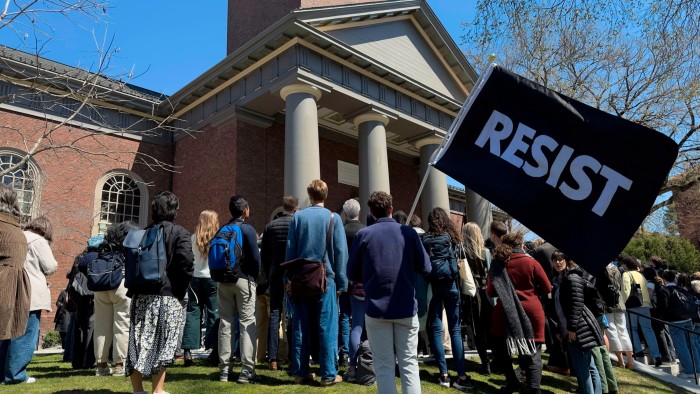Unlock the White House Watch newsletter for free
Your guide to what the 2024 US election means for Washington and the world
Harvard University risks paying a high price for its courage in standing up to intimidation by the Trump administration. Since the oldest US university refused to bow to White House attempts to force changes in its governance, federal officials have said they would freeze $2.2bn in funding. The Internal Revenue Service is examining whether to revoke its tax-exempt status. The government has threatened to ban it from enrolling foreign students. Yet academic freedoms and independence of higher education from state diktat are values that must be defended. Harvard is right to take a stand. Other universities should do the same.
The Trumpian assault on universities is ostensibly about purging “woke” ideology from classrooms and hiring, and combating alleged antisemitism. The administration has been threatening to withhold federal funding unless schools submit to its edicts, arresting students who took part in pro-Palestinian protests and capping scientific research costs — potentially a huge own goal against the American economy.
US universities do need to consider why they have become such bitter targets of the populist right. Some have gone too far in allowing left-leaning sentiment to predominate, tolerating practices such as “no-platforming”, and allowing education costs to spiral. But much right-wing criticism has been exaggerated, and threats and coercion from the White House are no way to bring about reform.
In reality, US universities are one target in a broader, insidious attack on liberal thinking and its perceived bastions by the Trump circle. This amounts to an attempt to control institutions that shape US intellectual and cultural debate. Bringing universities to heel is a hallmark of authoritarian regimes, as indeed is using tax threats as coercion.
It is regrettable that New York’s Columbia University chose to capitulate to the White House, though it was attacked first and received little public support. Even Harvard bowed to some earlier orders including changing the leadership of its Middle Eastern studies department. But after pressure from faculty, students, and probably some alumni, it rejected further government demands — including an external audit of “viewpoint diversity” — as illegal. Its president Alan Garber wrote that no government “should dictate what private universities can teach, whom they can admit and hire, and which areas of study and inquiry they can pursue”.
If any institution is equipped to stand up to the Trump administration it is Harvard, given its $53bn endowment, establishment clout and in-house legal brainpower. The presidents of Princeton and Stanford have spoken out in defence of academic freedoms. But Ivy League schools should form a common front, to resist attempts to pick them off one by one, and join with next-tier universities that have been faster to unite.
Harvard and others should be prepared to dip into their endowments to help weather the storm in the short term, though an unfortunate casualty may be wider access for lower-income students. They should mount a determined legal fightback in the courts.
There is a strong case that the Trump administration has exceeded its authority, in failing to respect academic freedoms and to follow due process. It has brandished penalties out of all proportion to universities’ alleged transgressions, without presenting clear evidence or waiting for formal hearings or appeals. The White House has shown itself ready to defy judges, as with its illegal deportations of Venezuelan migrants. Doing so repeatedly, however, might provoke pushback from broader sections of US society.
Harvard has entered a high-stakes battle. But the university’s stance might yet prove a turning point that will galvanise others — including law firms and businesses that have kowtowed to Trump — into resisting the widening assault on freedoms that Americans have long held dear.
